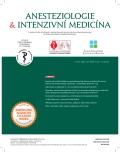-
Medical journals
- Career
Comparison of catheter high-frequency jet ventilation and conventional ventilation during interventional bronchoscopy in patients with upper airway obstruction
Authors: M. Paulíková 1; P. Matula 2
Authors‘ workplace: Oddelenie anestéziológie a intenzívnej medicíny, Východoslovenský onkologický ústav Košice, Slovenská republika 1; Klinika rádioterapie a onkológie, Východoslovenský onkologický ústav Košice, Slovenská republika 2
Published in: Anest. intenziv. Med., 29, 2018, č. 4, s. 187-192
Category:
Overview
Objective:
To investigate the risks and safety of catheter high-frequency jet ventilation in laryngeal surgery with varying degrees of airway obstruction.
Design:
Observational, prospective study.
Setting:
Department of Anaesthesiology at an Oncological Institute.
Materials and methods:
The study included 58 patients undergoing laryngeal surgery with varying degrees of airway obstruction, who were divided into two groups: patients ventilated by conventional mechanical ventilation and catheter high-frequency jet ventilation. Patients with cardiac and respiratory comorbidities, obesity and smokers were included. We evaluated the demographic data, effectiveness and safety of the two types of ventilation, and surgeon and anaesthesiologist satisfaction. The effectiveness of ventilation was assessed using arterial blood gas analysis. We were watching for complications such as hypoxia, hypercapnia, barotrauma, laryngospasm and bleeding.
Results:
58 patients were enrolled in the study, 26 (45%) of whom were ventilated by conventional mechanical ventilation and 32 (55%) were ventilated by catheter high-frequency jet ventilation. 72% of the patients were male. Airway obstruction was present in 25 (43%) patients, with the tumour most often located in the supraglottic area. Hypercapnia was more common in the high-frequency ventilation group. The incidence of complication was low, barotrauma or laryngospasm were not recorded. Hypoxia was present in 3 cases (9.4%) of patients ventilated by catheter high-frequency jet ventilation. In 2 cases there was catheter displacement which necessitated conversion to conventional ventilation in one case. The surgeons preferred high-frequency ventilation.
Conclusion:
Catheter high-frequency ventilation is effective and safe even under the conditions of various degree of airway obstruction. This approach reduces the risk of entry of debris and blood into the airway and provides a clear surgical field.
keywords:
high-frequency jet ventilation − catheter − airways obstruction
Sources
1. Galmén K, Harbut P, Freedman J, Jakobsson JG. The use of high-frequency ventilation during general anaesthesia: An update. F1000 Research. 2017;6 : 756.
2. Hunsaker DH. Anaesthesia for mikrolaryngeal surgery: the case for subglotic ventilation. Laryngoscope. 1994;104(8Pt 2 suppl 65):1−30.
3. Davies JM, et al. The Hunsaker Mon-Jet tube with jet ventilation is effective for microlaryngeal surgery. Can J Anest. 2009;56 : 284−290.
4. Paulíková M. Katétrová vysokofrekvenčná dýzová ventilácia pľúc a jej použitie v ORL chirurgii. Anesteziol. intenzívna med. 2017;6 : 46−49.
5. Patel A, Rubin JS. The difficult airway: the use of subglottic jet ventilation for laryngeal surgery. Logoped Phoniatr Vocol. 2008;33 : 22−24.
6. Davies JM. The Hunsaker Mon-Jet tube with jet ventilation is effective for microlaryngeal surgery. Can J Anest. 2009;56 : 284−290.
7. Hautman H, Gamarra F, Henke M, et al. High frequency jet ventilation in interventional fiberoptic bronchoscopy. Anaesth Analg. 2000;90 : 1436−1440.
8. Pathak V, Welsby I, Mahmood K, et al. Ventilation and anesthetic approaches for rigid bronchoscopy. Annals ATS. 2014;11 : 628−633.
9. Leiter R, et al. Comparison of superimposed high-frequency jet ventilation with conventional jet ventilation for laryngeal surgery. British Journal of Anaesthesia.2012;108 : 690−697.
10. Jaquet Y, Monnier P, Van Melle G, et al. Complications of different ventilation strategies in endoscopic laryngeal surgery: a 10-year review. Anesthesiology. 2006;104 : 52−59.
11. Bland M. An Introduction to medical statistics. IV. edition. Oxford University Press, 2015.
Labels
Anaesthesiology, Resuscitation and Inten Intensive Care Medicine
Article was published inAnaesthesiology and Intensive Care Medicine

2018 Issue 4-
All articles in this issue
- Comparison of catheter high-frequency jet ventilation and conventional ventilation during interventional bronchoscopy in patients with upper airway obstruction
- Serum concentrations of calprotectin and cagranulin C in polytrauma patients
- Spontaneous rebound of the anticoagulant effect of accumulated dabigatran after the antagonist activity cessation: Case report of life-threatening haemorrhage
- Nová definice status epilepticus a možnosti jeho farmakologické léčby
- The use of ultrasound in interventional pain management
- Patient transfers between healthcare facilities and referral healthcare facilities
- Anaesthesiology and Intensive Care Medicine
- Journal archive
- Current issue
- Online only
- About the journal
Most read in this issue- Nová definice status epilepticus a možnosti jeho farmakologické léčby
- Patient transfers between healthcare facilities and referral healthcare facilities
- The use of ultrasound in interventional pain management
- Serum concentrations of calprotectin and cagranulin C in polytrauma patients
Login#ADS_BOTTOM_SCRIPTS#Forgotten passwordEnter the email address that you registered with. We will send you instructions on how to set a new password.
- Career

